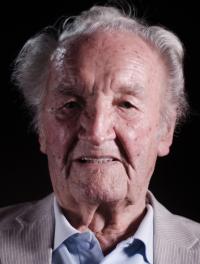The partisans didn’t know anything about farming, but they just declared it was theirs, and that was that

Download image
Matthias Slunsky was born in 1925 into a Croatian family in Frélichov. They spoke Croatian at home, but he learnt Czech at the Czech primary school and German after the southern Moravian border region was annexed to the Third Reich and the children had to attend a German school in Drnholec. In 1943 he was drafted into the German army and stationed in France near the city of Cherbourg. He was wounded by a grenade and taken for treatment and recovery to Vienna. After the war he walked home to Frélichov. In summer 1945 the boys and girls from the Croatian villages were to help the Russians take confiscated horses to Austria. During this trip Matthias Slunsky met his future wife, the Croat Růžena Mikuličová from Nový Přerov. They escaped to Austria together in 1948 and settled down in Vienna.
